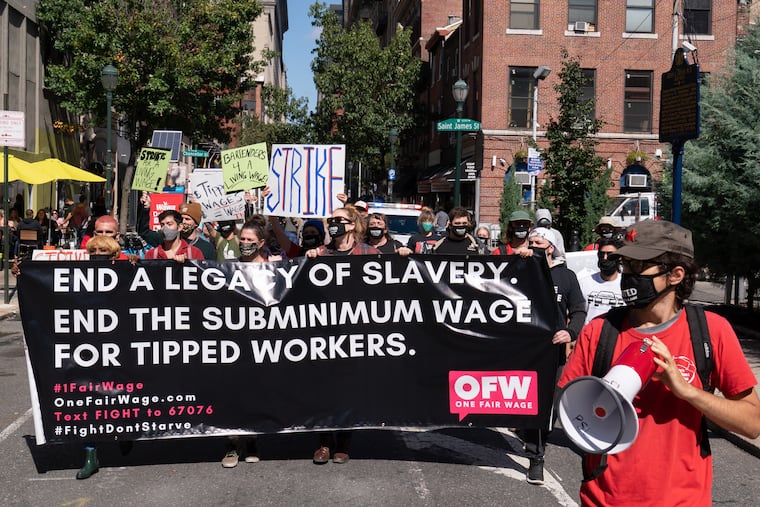Raising the minimum wage is just one way to spur job growth and speed Pa.’s recovery from COVID-19 | Opinion
Most states raised their minimum wage between 2020 and 2021. The commonwealth hasn't had an increase since 2009. A boost would make jobs more attractive to workers, writes Jennifer Berrier.

With headlines practically blinking red with warnings about a labor shortage, there’s a lot of talk about what the American worker is owed. I think honesty is a good place to start.
We do have an emerging economic crisis. What we don’t have is a lack of options to slow this train down before it heads over a cliff.
First, we have to confront the most immediate crisis, one that existed long before COVID-19: a shortage of jobs that afford workers and their families a future out of poverty.
Pennsylvania had a child poverty rate of 17% in 2019. That’s 435,000 children whose family income fell below the federal poverty line that year.
At $7.25 an hour, Pennsylvania’s legal minimum wage is state-sanctioned poverty for anyone who works 40 hours a week at that rate.
For seven years, Gov. Tom Wolf has encouraged the legislature to implement a $12 minimum wage with a pathway to $15 by 2027 — a proposal that would boost the incomes of more than one million Pennsylvania workers.
For seven years, the Republican-led General Assembly has failed to act.
» READ MORE: If D.C. won’t increase minimum wage for Pa., Harrisburg should | Editorial
Meanwhile, every state that borders Pennsylvania — New York, New Jersey, Ohio, Delaware, Maryland, and West Virginia — has increased its minimum wage beyond the federally required floor of $7.25 an hour. In fact, most U.S. states increased their minimum wage between 2020 and 2021. Pennsylvania has stalled since the federal government forced an increase in 2009.
Our economic recovery from the COVID-19 pandemic depends on what we do now in response to the demands of American workers for fair pay, paid time off, and safer working conditions. The truth is we are capable of designing a system that rewards full-time work with the ability to afford the basic necessities of life.
As the governor recently said, we’d be smart to start asking the question that really gets to the heart of the labor-shortage issue: How can we make jobs more attractive to Pennsylvania workers?
Legislation that creates a pathway to a $15-an-hour minimum wage — including State Sen. Christine Tartaglione’s SB 12 or State Rep. Patty Kim’s HB 345 — would be a huge step in the right direction. Gov. Wolf’s recent Worker Protection and Investment executive order goes further on behalf of Pennsylvania workers.
The Department of Labor and Industry is working with the Office of Administration to study the feasibility of implementing Occupational Safety and Health Administration standards for commonwealth employees. We are also working with other commonwealth agencies to ensure contractors and grant recipients are in compliance with labor and workforce safety laws — including the Minimum Wage Act, the Prevailing Wage Act, and the Equal Pay Law.
Per the governor’s order, L&I is also developing a list of organizations that violate labor laws, misclassify workers, owe unemployment compensation back taxes, or fail to carry requisite workers’ compensation insurance. We will make this list publicly available in early 2022.
» READ MORE: Pa. must increase minimum wage | Opinion
But we cannot meet this moment with unilateral action alone. The General Assembly must take action on behalf of Pennsylvania workers.
For example, the Wolf administration supports State Rep. Gerald Mullery’s bill, HB 549, which amends the unemployment compensation law to streamline the process for eligible Pennsylvania workers to access the benefit to which they are entitled.
State Sen. Vincent Hughes’ SB 13 would make employer-paid sick leave mandatory statewide — a policy already implemented by 10 other states and one Pennsylvania workers deserve as well. HB 1035, proposed by State Rep. Mike Zabel, would provide paid-leave protections to workers affected by COVID-19.
We also support State Rep. Pat Harkins’ legislation, HB 1976, which would extend the federal occupational safety rules to all public employees in Pennsylvania — rules that the nation’s private sector and federal employees have benefited from for 50 years.
We can navigate our way out of this crisis with policy, compromise, and collaboration. We owe it to Pennsylvania workers to try.
Jennifer Berrier is the Pennsylvania secretary of labor and industry.